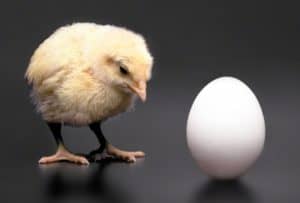
Source: https://www.marketingdonut.co.uk/
Age-old questions that have spooked us since we were young have been answered by science
Many of us grew up with seemingly “unanswerable” questions at the back of our heads, wondering if ever they could be answered. Some, more than others. You could say they haunted us all these years. A few people though know that science has already provided the answers to our questions. Take a look if some of these questions are what haunted you all these time:
1. Are Zebras black or white? Zebras are in fact, black horses with white stripes, and not the other way around. The white stripes are a genetic process called selective pigmentation, with the base color of the animal being black. And no zebra has exactly the same stripes. British scientists say this adaptation of zebras also attracts less horseflies.

Source: https://thumbor.forbes.com/
2. Chameleons change colors, how is this done? The prowess of a chameleon to change colors seems like a superhero power out of the comic books. Simply stated, the chameleons’ skin contains different pigments in their chromatophore-cells. When a chameleon needs to change skin color, its cells just squeeze the pigment into the center of the cell, changing the color. Science also points out that the blue pigment is hidden in the deeper layers of the skin, unlike the red, yellow, black, and brown, which are in the outer layers.

Source: https://cdn0.wideopenpets.com/
3. When we look at bright lights, what are the spots we see afterwards? These are known as “blind spots.” Staring into bright lights overstress the photoreceptors of the retina, so for a brief period they can not react to anything else after they get back to their normal state – creating the blind spots which is actually the light we were supposed to see.

Source: https://www.videoblocks.com/
4. Why do cats seem to stare at nothing? Ever wonder what a cat is looking at when it seems to be staring at nothing in particular? Some of us believe they can see ghosts. Actually, the cat is looking in front of itself as it is preparing to sleep. If it is staring transfixed to its side, it is because it has heard or smelled something that aroused it,waiting for the sound or movement to repeat.

Source: https://t2.ea.ltmcdn.com/
5. Why do we feel the Deja-vu effect? Ever had that feeling that something we are currently experiencing has happened before? Modern neuroscientists believe that this is a short term dysfunction in certain regions of the brain caused by stress, fatigue, and at times, intoxication. Our brain gets disoriented and treats new impressions as old ones. Memory can also influence situations making it appear that we’ve been here before, or are familiar with an event like it happened before.

Source: https://cdn1.medicalnewstoday.com/
6. Why do we feel better with less sleep than with long sleep? Sleeping for longer periods does not necessarily mean you are more rested. Many factors may affect our feelings when we awake. If you ate something bad, or drank a lot of coffee, or too little water, your body can still feel tired even after a long sleep. If you get tired during the day, a short nap of about 30 minutes will be just right to recharge you. If you sleep longer, it will be harder to really wake up and that is why you will feel more tired after a long sleep.

Source: https://cff2.earth.com/
7. Why do we sometimes appear to look like one of our ancestors? Our genes can either be dominant or recessive. Looking like a distant relative means the genes have become dominant again with you, and recessive for the rest who don’t look like that relative. Even brothers and sisters may not appear similar, if some take the genes of the father and others, from the mother.

Source: https://wgp-cdn.co.uk/
8. How can we laugh? Laughter is a motor function induced by several areas of the brain. It involves around 80 facial muscles to be able to laugh. It can be caused by the contraction of the diaphragm and vocalization, come about with different emotions like happiness, nervousness, even fear. And laughter can improve life, help treat afflictions like asthma, and help you live longer.

Source: https://media.mnn.com/
9. Why does time seem to go by faster as we get older? When we were younger, our brain received and processed information faster, so the impression of time being slow was normal. As we get older, our brain has to take longer to process information, giving the impression that time flies. But the perception of time is very subjective, and varies from person to person.

Source: https://ep01.epimg.net/
10. So which came first, the chicken or the egg? A classic paradoxical dilemma : If the egg came first, what laid it? If the chicken came first, from where did it come from? As kids we observed that chickens lay eggs, some of these eggs hatch, become chickens that lay eggs, and others, well, end up in our breakfast meal. Well the answer to which came first can now be revealed, thanks to science. The egg came first. The evolution of life starts in the egg, it took a lot of time before the chicken developed from the egg, or for that matter other creatures. That’s life!

Source: https://curiosmos.com/
Like ✪ Share ✪ Be Awesome
What are your thoughts? Please comment below and share this news!
Awesome Jelly / Report a typo









































